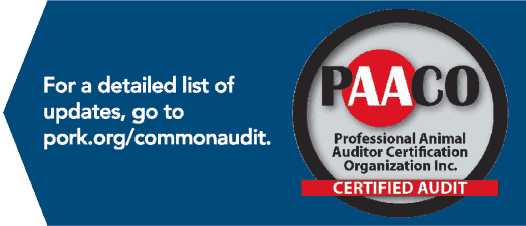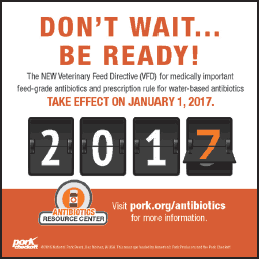“As always, the producer-led science and technology continues to focus its efforts on creating value for its producer stakeholders by leading the pork industry in subject-matter expertise and knowledge,” said Dave Pyburn, the National Pork Board’s senior vice president of science and technology. He says this stems from decades of leadership from its associated committees and unwavering dedication to funding valuable research that benefits the entire industry.
Pyburn cites these figures as further proof of Checkoff’s success:
- 74 science-related projects funded by the National Pork Board in 2015;
- $5.7 million in total funds allocated in 2015 for 74 projects;
- $579 thousand in foreign-animal disease research funded in 2015;
- $750 thousand in funds allocated in 2016 for antibiotics research.
“Checkoff-funded research in the science and technology area will be critical to the success of the National Pork Board’s 5-year strategic plan,” Pyburn said.
For more information, contact Dave Pyburn at DPyburn@pork.org or 515-223-2634.
Antibiotics: Blue-ribbon Panel gets to work
In its first face-to-face meeting on February 1-2 in Dallas, the Pork Checkoff’s independent Blue-ribbon Panel on Antibiotics covered a lot of ground, including everything from standard operating procedures for today’s pig farms to antibiotic resistance and consumer research. These sessions were designed to aid the panel’s work on its four key objectives:
- Review the status of antibiotic use in the pork industry;
- Review industry efforts in antibiotic research and producer education;
- Identify opportunities for improvement in current antibiotic practices;
- Provide input on how to improve antibiotic stewardship in the pork industry.
“We’re pleased that the third-party panel has begun its work so quickly on the critically important issue of antibiotics,” said John Johnson, National Pork Board chief operating officer.
“We’re proud to have played a role in bringing this level of talent and expertise together,” he said. “These experts will be addressing this issue in a comprehensive way that will help the industry improve our stewardship of antibiotics.”
For more information, contact Jennifer Koeman, director of producer and public health, at JKoeman@pork.org or 515-223-2633.
Pork Checkoff offers crisis texting
The National Pork Board now offers PorkCrisis Alert, a news texting service that will immediately notify any opted-in producers or veterinarians of a crisis or emergency of national scope. Text PorkCrisis (no space) to 97296 to opt in for the Pork Checkoff’s new crisis-emergency alert system. As is usually the case, message and data rates may apply. Text HELP to 97296 for help. Text STOP to 97296 to cancel. For terms and privacy: pork.org/smsterms.
For more information, contact Cindy Cunningham, Pork Checkoff’s assistant vice president of communications at CCunningham@pork.org or 515-223-2600.
 More robust Common Swine Industry Audit adds clarity
More robust Common Swine Industry Audit adds clarity
The Common Swine Industry Audit has been updated for 2016 to provide a clearer road map for producers to prepare for their next audit. This audit tool builds on the existing Pork Quality Assurance Plus (PQA Plus) program and expands it to serve as a single common audit platform for the pork industry.
The overarching goal of the common audit process remains unchanged: to provide consumers greater assurance of the care taken by farmers and pork processors to improve animal well-being and food safety.
“The majority of the changes to the 2016 edition of the audit are mainly for clarification, with the format, sections, and scoring remaining the same,” said Jamee Amundson, animal welfare manager for the Pork Checkoff.
The two most significant changes involve clarifications for record-keeping and the on-farm use of needles to treat pigs.
“The updates to the Common Swine Industry Audit are part of the industry’s focus on continuous improvement,” Amundson said. “By constantly focusing on how to do things better, producers are helping build consumer trust in how pigs are raised on farms today.”
Adjustments made this year, with input from the Common Swine Industry Audit Task Force, include
- Willful acts of abuse or neglect – Defined as acts outside of normally accepted production practices that intentionally cause pain and suffering. Willful acts of abuse now also include intentional out-of-feed events.
- Timely euthanasia of animals – A new broader definition increases the parameters in which euthanasia is required.
- Internal site assessments – More details are now included on what an internal site assessment should include.
- Caretaker PQA Plus certification – Animal caretakers must be certified within 90 days of employment. Before, it was within 6 months.
- Mortality records – Mortality records (including those for animals that die or are euthanized) must be kept for 12 months. This aligns with the retention policies for daily observation records.
- Needle use – Caretakers must receive and be able to articulate training specific to broken needles according to the site’s standard operating procedure.
- Needle requirements – Needles that are 16-gauge or larger need to be labeled as highly detectable. As a new addition, producers with questions on highly detectable needles should contact their veterinarian or PQA Plus advisor.
- Biosecurity – Restrictions to control access to a site to support biosecurity practices now include security cameras and locked gates, doors, or both.
For a detailed list of updates, go to www.pork.org/commonaudit.
For more information, contact Jamee Amundson at JAmundson@pork.org or 515-223-3534.
 Pork Checkoff’s VFD and antibiotics materials available now
Pork Checkoff’s VFD and antibiotics materials available now
If you need to help get the word out to pork producers about the new FDA antibiotic regulations, consider using the Pork Checkoff’s producer-focused education materials. “We’ve developed these tools specifically to help guide pork producers through these big changes that will affect the way they use antibiotics,” said Mike King, director of science communications for the National Pork Board.
For more information, visit www.pork.org/antibiotics and order or download materials at the Pork Store, which is accessible via pork.org. For other inquiries, contact Mike King at MKing@pork.org or 515-223-3532.
